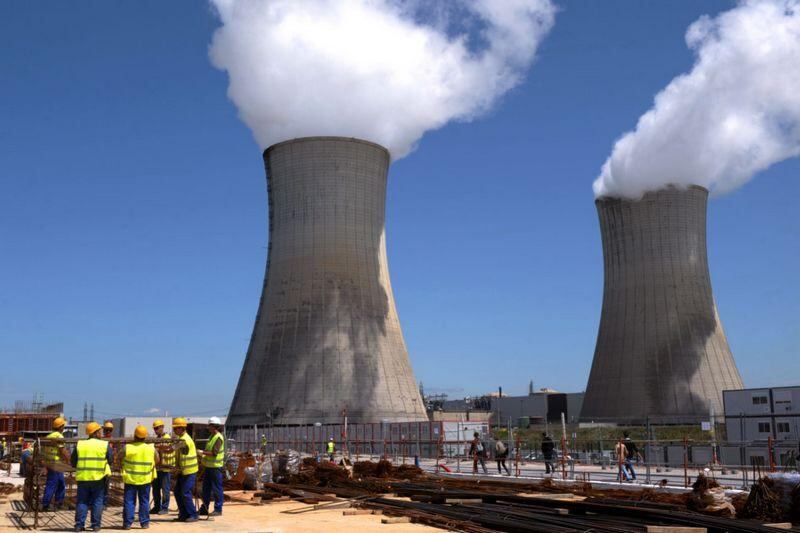The surge towards nuclear power development in the Middle East has some western nations worried, but not for the usual reasons. Instead of sounding the alarm over nuclear weapons proliferation, they are concerned that the region's new atomic sectors may offer rich contracts to lure managerial and technical talent away from countries with established nuclear industries. That could be a problem for the US, France and Britain because the global nuclear industry, which many say is set for a rebound, has experienced a worldwide skills shortage.
The newcomers "have no legacy programme to use as a source for nuclear expertise", says Adrian Bull, the UK stakeholder relations manager for the US nuclear reactor builder Westinghouse Electric. "If you have literally nothing to go on, you have to be the Chelsea or Real Madrid (football club) and buy in the people from elsewhere." The UAE is expected in September to award a master contract worth at least US$40 billion (Dh146.72bn) for the design, construction and operation of a fleet of nuclear stations to supply the nation's power requirements.
The country is already hiring nuclear talent from all over the world, says Iain Manson, the head of energy and utilities in Europe, the Middle East and Africa for the recruitment company Korn/Ferry International. Among other things, the Government needs to set up a nuclear regulatory agency. In a recent report, Korn/Ferry outlines the challenges facing the industry as the world embarks on its biggest civilian nuclear power expansion in decades: "Some of the most important questions facing organisations throughout the nuclear supply chain involve resource constraints.
"These issues, which boil down to steel, technology and people, will obstruct the nuclear industry's resurgence if they are not properly addressed." In March, Lawrence Williams, Britain's former chief nuclear inspector, warned that a shortage of inspectors was putting the safety of UK reactors at risk. The British government is expected to seek bids next year for the construction of a new reactor, after years of allowing its civilian fleet to stagnate as environmentalists fiercely fought expansion proposals over worries about radiation leaks and nuclear waste disposal.
Now, new environmental concerns about global warming are enabling developers to dust off plans for emissions-free nuclear plants. Thus, the shortage of regulatory resources comes at an especially awkward time. "There is a growing backlog of work that is being delayed or not being done and this, together with new work arising from industry programmes, concerns me," Mr Williams said in March. The Nuclear Installations Inspectorate, the UK nuclear regulator, has more than a dozen vacancies for inspectors, despite a recent recruitment drive.
Senior inspectors and engineers have left for better paid private-sector jobs, leaving the agency with only 16 people to oversee a complex approval process for new reactors, for which at least 40 senior staff are needed. Canada's oldest nuclear power station, on the outskirts of the nation's biggest city, Toronto, may not have enough experienced staff to deal with serious accidents or emergencies, the Canadian Nuclear Safety Commission said recently.
The Pickering station's six reactors last year lost about a quarter of their expected electricity output due to unplanned shutdowns, placing the power plant among the worst performing in the world. Problems included algae blooms clogging water-intake pipes that are essential for cooling the reactors to a safe temperature. Experts have been warning of fallout from a nuclear skills shortage for years.
"How many reactors will be built is one question, and how many people will be available to construct them is a different one," Luis Echvarri, the director general of the Nuclear Energy Agency of the Organisation for Economic Co-operation and Development, said at the 2007 World Energy Congress in Rome. Duncan Hawthorne, the chief executive of the Canadian nuclear generating enterprise Bruce Power, says a leadership vacuum is an even bigger issue for the industry than the engineering shortage. "We can always manage the technical issues but if we don't have the leadership or skills, no organisation can move forward," Mr Hawthorne says.
Korn/Ferry is urging western countries to recruit nuclear talent from abroad: "North American companies that have begun to recruit in Asia generally find talent that is extremely well trained from a technical perspective, possesses experience running some of the world's best-performing facilities and frequently speaks English, which effectively qualifies as the industry's primary language." That raises the intriguing possibility that the UAE could one day export home-grown Emirati nuclear experts to Europe or the US.
As part of the UAE's nuclear programme, Masdar, the Abu Dhabi Government's advanced energy company, is setting up a postgraduate training programme for nuclear industry professionals. One of its recent hires, Dr Youssef Shatilla, an Egyptian-born former visiting professor in the nuclear science and engineering department of the Massachusetts Institute of Technology, has just joined the Masdar Institute of Science and Technology as a professor of nuclear engineering.
@Email:tcarlisle@thenational.ae





